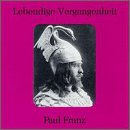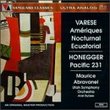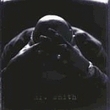| All Artists: Giacomo Meyerbeer, Richard [Classical] Wagner, Giuseppe Verdi, Charles Gounod, Georges Bizet, Camille Saint-Saens, Ernest Reyer, Jules Massenet, Paul Franz Title: Lebendige Vergangenheit: Paul Franz Members Wishing: 0 Total Copies: 0 Label: Preiser Records Release Date: 8/22/1995 Genre: Classical Style: Opera & Classical Vocal Number of Discs: 1 SwapaCD Credits: 1 UPC: 717281890991 |
Search - Giacomo Meyerbeer, Richard [Classical] Wagner, Giuseppe Verdi :: Lebendige Vergangenheit: Paul Franz
 | Giacomo Meyerbeer, Richard [Classical] Wagner, Giuseppe Verdi Lebendige Vergangenheit: Paul Franz Genre: Classical
|
Larger Image |
CD DetailsSimilar CDs |
CD ReviewsThe French Paradigm Charlus | NYC | 01/20/2006 (5 out of 5 stars) "I am often asked why I am so down on modern singers, in particular modern singers in French music. The answer is simple: because I have heard better. It is not only a matter of having a good voice: many modern singers have good, excellent voices. It is a combination of technique, style, imagination, heart. Very, very few contemporary singers seem to have all these together. Their admirers, who are as ardent and fanatical as those of us who are ardent and fanatical about the singers of yesteryear, deeply and violently resent the denigration of their favourites. And so it has been for a long, long time: operatic singing has been in decline since the XVIII Century, no question about it, and now we happen to have some 110 years of recorded evidence to prove it.
Take the singing of the great Paul Franz, 1876 - 1950, at the Paris Opéra between 1908 and 1938, as Exhibit A. We shall never hear the reportedly exquisite vocalising of a Mario or a Talazac, any more than we shall hear the legendary tones of the great castrati from the age of Händel and Mozart. Of Victor Capoul and Jean de Reské, celebrated magicians of the romantic age, the recorded evidence is so wretched that what little we can gather from it must be taken mostly on faith--even if seasoned specialists can certainly learn a lot from the pathetic shards they bequeathed us. Paul Franz, however, we can listen to in dozens of excellent recordings made for HMV, Pathé and Columbia between 1909 and 1932. Listen carefully to this tenor! He is a superb exponent of an art now lost. Of what he is--a dramatic tenor of the Paris Opéra--he is the best there is. He not only had a large, rich, fabulous voice indeed, but also the technique and understanding to bring it to its full potential, both as a musical instrument and as a vehicle for dramatic expression. He understood not only the smooth bel canto style of legato singing in the classic Italian manner, but also the French tradition of dramatic déclamation, so that his singing has an urgency, a pathos, an eloquence of phrasing that is, cumulatively, overwhelming. Roméo's Tomb aria, from Gounod's 1867 opera, is a succession of alternating moods, from desolation to ecstasy, expressed in interspersed arioso and declamatory movements all of which are articulated by FRANZ with total self-confidence and an unfailing sense of gathering climax that HE can create because HE has all the voice, all the command, all the breath and all the verbal authority in the world. And, I might add, a voice of incomparable beauty! Contrast to that the neutral, regulation fervour of Plácido Domingo, a singer with somewhat comparable vocal endowment and technique, but nothing like the same heart or imagination. Singing this type of romantic music requires plenty of both. Franz had a rapt, chevaleresque manner (he was a strikingly handsome giant with a beautiful face of dreamy blue eyes and souverain long nose worthy of Raphaël!) totally suited to impersonating Romeo. He sounds like a nobleman. [ see: www.cantabile-subito.de/Tenors/Franz__Paul/hauptteil_franz__paul.html for several great pictures] The earlier Balcony scene romance is a more lyrical piece, and would seem not altogether in the line of a celebrated Tristan and Otello, which Franz was. But here he finds a golden tone and a simple, manly grace that are particularly affecting. Compare to that the dry, unsettled, throaty, "emotive" yelling of the appalling Roberto Alagna, short at the bottom, constricted on top and uncouth throughout! A large part of Paul Franz' nobility and authority as an interpreter comes from his perfect command of the French language as a medium for singing. I cannot stress sufficiently the importance of knowing how to enunciate French in the classic manner! No American would take seriously a performance of Showboat or Caroussel in which all the performers sang with thick, approximate, ill-stressed Ruritanian accents! Sure, one might accept an Ezio Pinza, very much as one kind of accepts his terrible French in French opera, because he was otherwise such a wonderful, communicative artist, with such a unique voice. But what would you think of an all-Italian, or, for that matter, an all-Hungarian, Oklahoma?? All ze kettle are stendink like-a statoos, All ze kettle are stendink like-a statoos, Ze korn eez ass hay ass en elephant's aye..... Ach, vat a beooteefool mawnink....! Yet when the French equivalent is deprecated, so many people are irritated as if something unacceptably pedantic were being proposed. Whether you listen to the first selection on this CD, a 1912 Huguenots romance that is a wonder of fresh, spontaneous lyric tenderness ("...Je t'aime et t' aimerai toujours, beauté du ciel, ô reine des amours!"), or the last, a 1929 grand air from Hérodiade that shows Franz, at age 53, still in perfect command of his voice and style ("Salut, salut! Premier rayon de l' immortalité....!") though the whole gamut of the heroic and the lyric repertoire, this is authentically IMMORTAL singing. I would give it a hundred stars if I could! " |

 Track Listings (18) - Disc #1
Track Listings (18) - Disc #1



